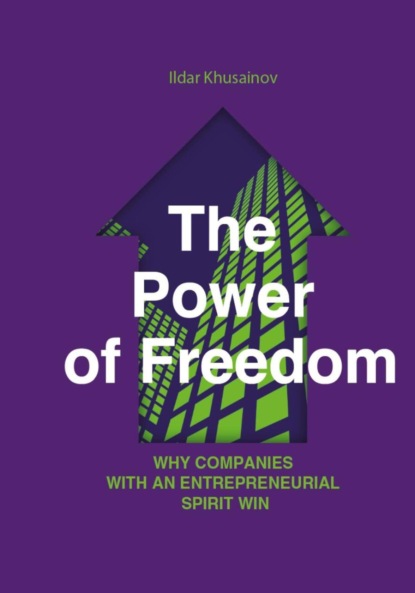The power of freedom

- -
- 100%
- +
This is fundamentally the right approach. You can do it differently and hire expensive candidates, but will that be justified? Not always. Strong candidates are also needed, but their effectiveness must be supported by results. This is a straightforward example of how an entrepreneurial model should be structured.
Let me give another example. Mortgage brokers have been motivated based on results rather than just conducting consultations. Now they work differently. Marketers are responsible for business volume rather than just incoming client flow. Even our lawyers are incentivized to sign as many contracts as possible. They compete with each other: they earn 75 rubles per contract, and 120 rubles during evening hours. As a result, by 8 AM all contracts are ready, and there’s even a queue for them at night. I see that employees are still working at 2 AM.
We don’t force anyone. We simply say: “Here’s your money; if you want to, go ahead and do it.” We always monitor whether we need to increase salaries, and we see this through results in three systems. At higher management levels, we ensure motivation through net profit. Many of our leaders participate in the distribution of the company’s net profit.
Once, I had a conversation with a talented employee. I offered him a five-year contract where his salary would be based not on achieving KPIs but on a percentage of net profit. We would find legal forms for this, establish partnerships, shares, and everything else. He declined: “No, I’m not ready. Let’s do 100,000 fixed salary and 100,000 for KPIs.” Six months later, he came back to me and said: “Ildar Borisovich, after working with you, I’ve changed my mind. I’m interested in trying a different relationship scheme; I’m ready for your terms.”
We signed a five-year contract, and his effectiveness increased fivefold, if not tenfold. Within two years, his income consistently exceeded one million rubles, and his contribution to the company became invaluable. With a fixed salary and KPIs of 100,000 rubles, he would never have achieved such results or become such a valuable employee.
When an employee understands that every action they take is fairly compensated, their potential is unleashed. Their inner strength comes to the surface. This is the foundation: 1 + 1 becomes 11. However, to harness this potential, one must be generous. Unfortunately, most leaders are hindered by greed.
Why do I speak about this so calmly? Because I have seen it happen many times. Sometimes I ask people a question: “Imagine you’ve gone to Bali, and your business, under the leadership of an employee, has earned 500,000 rubles. You did nothing, and a year later the business is generating 5 million rubles a month. How much are you willing to give to the employee who made this happen?” The most common answer is 10–12%.
Let me share how I personally battled my own greed. Here’s what you need to know about human greed: it’s rooted in the instinct for self-preservation. People have a tendency to hoard. Primitive humans, after killing a deer, didn’t know when they would catch another one. Without refrigerators, they needed to consume as much as possible. This instinctive greed is ingrained in all of us.
In our entrepreneurial culture, there is no value placed on investing. We are not accustomed to giving in order to earn more later. This is a legacy of our primitive communal past and humanity's long evolutionary journey. Our first reaction when we receive something is to hold onto it. Understanding this fact will help us manage ourselves and our decisions better.
The ancient Egyptian pharaoh Tutankhamun was right: you can’t take anything with you when you leave this world. To think otherwise is to succumb to illusions. So the first reason for greed is the instinct for self-preservation. The second is the fear of uncertainty. Greed requires letting go of something, which triggers fear of the unknown. Even businessmen who keep their funds in dollars are afraid to convert them into rubles, worrying they might lose value. Their minds start painting terrifying scenarios. Many who switch to dollars never convert their money back into rubles; they become prisoners of their savings.
I am an advocate for investing. Money should not sit idle. I have always invested in real businesses. This is a separate topic – investment thinking – and I plan to dedicate an entire chapter to it. The fear of risk is the third reason for greed. Those who do not understand or know how to manage risk will always resort to hoarding. Only knowledge allows one to manage risk and feel comfortable with it.
The fourth reason for greed is distrust of others. A greedy person often does not trust anyone else. They genuinely believe that only they can manage money correctly and that without them, money will be wasted. This reflects a lack of faith in other people’s abilities.
These four aspects of greed – self-preservation instinct, fear of uncertainty, and distrust of others – hinder our development and progress. To overcome them, we need to cultivate an investment mindset and learn to trust others. To illustrate this point, let me share an interesting experiment: a person is given a trinket and asked how much it’s worth. “Three dollars,” they reply. Then they’re told, “Here, keep it; it’s yours.” When asked how much they would sell it for, they respond, “Eight dollars.” Why? Psychologically, people perceive their possessions as more valuable. When something becomes theirs, its worth increases in their minds compared to how they would value it if it didn’t belong to them.
Here lies a trap. I found it very difficult to deal with this. I admit that at first, I was reluctant to give people money. I was stingy and didn’t realize it was a serious flaw. Only now, as I write these lines, can I calmly acknowledge that all the components of greed were within me.
There were times when I was tight-fisted with employee salaries, even when I had enough resources. I hoarded like a hamster instead of investing. Over time, my mindset changed. Several books helped me, especially Daniel Goleman’s "Emotional Intelligence," which I highly recommend. This book discusses, among other things, the nature of greed and the characteristics of human thinking. Greed is always about the past. It is a remnant of the past, while creating future value requires us to be willing to live in the future.
When a person wants to accumulate something, they are essentially choosing to live in the past. Investments are about the future. Each person decides whether to live in the past or look ahead. Many people on their deathbeds regret that they didn’t spend more and didn’t give enough to others.
I derive immense pleasure from seeing my top managers earn well. It makes me ten times happier than my own income. What drives me is the desire to continue developing the business so that my employees can earn well. I want them not just to work for me but to work alongside me, feeling that this is their own venture.
I am willing to sacrifice my income. For instance, during crises, I continue to pay my top managers whose salaries depend on net profit. Even when there is no profit, we implement hedging strategies. For example, in 2004, we hedged our top managers for four out of twelve months. I want to share a story: several top managers approached me then and said, “Ildar Borisovich, we see that things are tough for you right now. Maybe we shouldn’t hedge our salaries?” I replied, “We should.” One of them sat with me for 30 minutes, convincing me that he was doing fine, that he cared about the company and didn’t need the money. I said, “Let’s skip the altruism; it’s not quite right. I’m confident that the business's capitalization is growing, even if it’s declining at the moment. We are creating value, and as soon as the market situation improves, our company will reach a new level. Consider this a form of payment through capitalization and a sign of increased company income.”
In the past, I aimed to accumulate, but then I realized it stemmed from the fear that there wouldn’t be enough money. But those fears are misguided. If a person starts hoarding instead of sharing with others, there truly won’t be enough money.
These fundamental insights changed my perspective on motivation and business. I detailed this in a post on VK, where I explained how proper motivation is formed and how to apply it. You can read this material by scanning the QR code provided on this page.

https://disk.yandex.ru/i/4OPe3QZhtIqNJQ
I believe that those who recognize and appreciate the strengths of others will always reach greater heights, build strong teams, and achieve outstanding results. I’ll be honest: I didn’t possess this skill initially, but I have developed it and continue to do so. Learning is a lifelong journey. What did I do? I attended numerous HR conferences and read books on assessing abilities and competencies. Gradually, I began to realize how little I actually knew.
Now, when I conduct interviews, I often feel like a kind of robot because I’ve mastered many techniques and methodologies. Of course, I try to remain human, but I’m genuinely interested in understanding how the candidate’s “processor” works, how they relate to others, and the extent of their self-reflection. Each of us has our own “processor,” which doesn’t change much over time. There are indeed people with strong cognitive abilities who think quickly, but even their capabilities are limited.
If a person is hardworking, loves people, is honest, principled, and courageous, then their “processor” is more than sufficient for great achievements. In the past, I believed that the “processor” determined everything. However, as I approached my 40s and 45s, I realized that upbringing, environment, principles, and a person’s inner world also play a crucial role. Strong individuals want to work with other strong individuals, which is why sometimes I make the tough decision to let go of those who are not capable of growth. If I don’t do this, I risk losing my top employees.

With Ekaterina Dzhanbrovskaya, Executive Director of the Vladivostok Office, during a business trip to the city, September 2024
To track employees and identify weaknesses, we have a well-structured management system in place. We have a dedicated HR department, a specialized evaluation department, and we utilize specific technologies. We constantly conduct reviews and assessments. Some might call this bureaucracy, but I see it as order. It’s an essential tool that any business should employ.
I believe a company should either focus on finding strong individuals and developing their talents or try to cultivate all employees, but in that case, the overall level of professionalism is unlikely to be high. My approach is to seek out talent and nurture it. The business environment is tough, and if resources are spent on those who cannot grow quickly, the company will struggle financially.
Sometimes a top manager comes to me with a recommendation to hire a good specialist. I say, "Let’s meet and conduct an interview." But if during the conversation it turns out that the person seems decent but their mindset and work approaches don’t align with our values, I decide, "No, we won’t proceed further."
I recently read a book discussing three personality traits: creativity, genius, and intuition. I agree with this. Creativity, genius, and intuition are sparks that everyone should possess. These qualities are difficult to measure or assess in an employee's work. The average evaluation cycle for an employee’s performance is a year; for a manager, it’s one and a half to two years. A performer with a limited role can be evaluated in six months. However, operational staff on the factory floor can be assessed in just one minute – put them in their position, and it’s immediately clear if they fit or not.
However, qualities like courage, resilience, and kindness are harder to evaluate. Life presents situations where people reveal themselves under unexpected circumstances. Remember the scene from "The Dark Knight" where criminals were on one ferry and ordinary citizens on the other? A criminal refused to blow up the ship while a civilian broker was ready to push the button.
Such situations are hard to predict. Therefore, when I talk about talent, I mean that the system should be able to accurately read people's abilities and allocate resources to them when necessary. It's important to understand that there is a significant underwater part of an iceberg. To uncover this "part" in employees, a company must regularly invest in their assessment.
Organizations that implement such approaches will always evolve, and companies with these systems will succeed. A culture of attracting talent inherently fosters the recruitment of talented individuals. Employee development is the most challenging but not the most expensive function. Anyone can quickly answer whether they are growing in this company.
There’s a parable about a young man who asked a wise man how to know if his girlfriend loves him. The wise man replied that if he doesn’t feel that love, he already knows the answer to his question. The same applies in organizations: every employee should unequivocally answer "yes" to whether they are being developed here. This is challenging because the development function does not yield immediate results. Real results appear after 8–12 months of working at the company, especially for senior managers. Basic skills can be acquired more quickly, but serious development takes time.
In our company, we have powerful trainers, adaptation specialists, and strong managers, all contributing to a culture of employee development. We refer to ourselves as a "realtor factory" because we train our agents from the ground up. This is our core business, and I believe in fostering an entrepreneurial culture within each employee. We must help them grow.
We have a screening process in place, and once a recruiter has brought someone on board, our goal is to turn that new hire into a true star. To achieve this, we utilize all available mechanisms: communication, interaction, emotional intelligence, and even mindset.
When we invited business trainers, our finance team rushed to me, saying, "Ildar, get rid of them! We're just throwing money away! Let the managers train the new hires themselves." I responded, "Hold on, let's see how this plays out. Our productivity will increase, turnover will decrease, and people will want to develop. Otherwise, how will we differentiate ourselves from other companies if we don't invest in our employees' growth?"
Chapter 14. About Frugality
One of the main challenges entrepreneurs face is that people often use the saying "penny-pinching" to describe them. The nature of this perceived greed remains unclear, even though entrepreneurs themselves see their behavior as being frugal rather than greedy. The ability to evaluate every ruble and resource is an innate quality that varies in development from person to person, much like the capacity to share results and trust in the system and others. The intensity of these personal traits differs for everyone, similar to how the knobs on a mixing console are set at different levels.
Everyone knows and feels what qualities they possess. For example, I've come to realize that I can be a bit stingy, but I also consider myself a kind person. I can be persuaded to lend money if approached in the right way. I’m fortunate to have someone even more frugal by my side – he even suggests taking a pay cut himself. Let me share a work-related episode that left a strong impression on me – so much so that I decided to include it in this book. One day, Sergey Petrovich Shchepelin came to me and began persuading me to reduce his salary and that of some top managers, believing they were overpaid. We discussed this for about an hour, each expressing our viewpoints. This incident, like the story about hedging, reflects the culture of our organization and the level of trust within the team. Our employees aren’t afraid to discuss even sensitive topics because they have a sense of fairness.
It might be hard for some readers to believe that someone would voluntarily ask for a pay cut, but this became possible due to the culture we’ve created. When such a value system is established within a team, leaders and their subordinates become partners. Employees start thinking not just about themselves but about the business as a whole. This represents a high level of engagement that can be compared to maternal love. An employee is willing to do whatever it takes for the company's well-being, even if it means taking a pay cut.
I always oppose discussions about efficiency on a philosophical level – this is when someone raises the topic of efficiency without proposing any concrete solutions. For example, we recently optimized the work of our departments. Each department head would say, "We need to cut that department!" But I would respond, "Wait, what about your department? Shouldn’t we cut yours too?" And I would hear back, "Why should we cut mine? Everything’s fine here!" This pattern repeated itself every time we talked about optimizing anything. Everyone always insisted, "No, no, no – this applies to others, not us."
People are inherently unable to independently improve their internal efficiency. Here’s another example: Recently, our esteemed realtors actively began advertising on platforms like Avito and Cian. What happened was that prices on these aggregators started to rise, trapping us in a vicious cycle. We were covering demands while being asked for an even larger percentage of subsidies. Then we complicated matters further by subsidizing ads on these platforms. We reduced each realtor's expenses by up to 70%, paying for advertisements out of our own pockets. As a result, realtors lost touch with their actual expenses and began purchasing ads on Avito and Cian aggressively, causing those platforms to overheat from demand.
That's when I realized why being a bit frugal can sometimes be necessary and even beneficial. Why is it important for people to receive what they deserve, even if it costs a bit more than they can afford? It’s dangerous when global disparities allow things to be obtained cheaply. I often use this example: imagine what would happen if the government covered 70% of the cost of a car for every individual. Public transportation would become obsolete. Getting a driver's license would suddenly be advantageous. Owning a personal vehicle would be cheaper than taking a taxi, which is a reality. Thus, the cost of owning a car would align with the actual expenses of public transport. Some would gain an unfair advantage while others would lose out. The number of pedestrians might decrease because some would switch to cars. As a result, a cycle of incorrect processes would be set in motion.
Most of us don’t have an inherent tendency towards efficiency. That’s why marketers around the world easily explain why many women dream of buying a handbag that costs 150,000 rubles.
One important thing everyone should understand is how humans are wired. This is crucial because knowing human nature allows for effective management of various processes. I consider myself a kind person, but I’m also economical. For instance, I recently bought my mom a three-year-old used car with low mileage – only about 30,000 kilometers. A new Volvo like that would cost around 10 million rubles, but I found one with low mileage for just 5 million rubles. I believe the price difference is insignificant since the car is practically new. It’s all about finding that balance. I chose a Volvo, a premium brand, without regretting the expense. Of course, I could have bought something much cheaper, but it’s important to feel that balance. For me, it’s essential to spend money wisely. If I decided to gift my mom a good premium car, why not do so by buying a used one at half the price? She got an excellent vehicle that looked brand new.
However, when it comes to business, I fight for every ruble. I don’t waste money unnecessarily, neither on myself nor on anything extraneous beyond my personal needs. My main expenses are family needs and helping my parents. If I were living alone, I’d probably be in a small one-bedroom apartment and using public transport instead of driving a car. That aligns with my internal beliefs.
The question arises: how can we instill this same frugality into our systems on a philosophical level?
In this context, we have three main categories: greed, stinginess, and frugality. Once someone asked me, "What’s the difference between greed and stinginess?" I replied, "A greedy person thinks only of themselves without considering the needs of others. Stinginess is when you set high standards for yourself while also striving for savings for everyone." Frugality is the art of finding the golden mean between system development and resource conservation. If frugality could be expressed mathematically, it would yield a formula:

In companies, and more broadly, greed refers to the inability to share. In my view, stinginess is not just about being economical; it’s about using resources wisely. Frugality pertains to business: the ability to effectively conserve resources and energy while minimizing waste.
These terms may seem similar, but they are actually quite different. They are often confused, but for now, let's not delve into their semantics. Simply put, in business, the return on resource investment plays a crucial role.
I am a big fan of the concept of lean manufacturing. I’ve participated in internships, attended training sessions, and read all the books I could find on "Kaizen" and "Six Sigma" methodologies in the service sector, lean manufacturing, and how these principles are applied in Toyota factories. However, in my understanding, lean manufacturing is more about growth than simply optimizing current operations. There is also strategic frugality, which is less frequently discussed. Interestingly, it requires a more intensive use of resources.
For most people, the term "frugality" is associated with minimizing costs to achieve results. But I always teach my employees: "We need to achieve greater results with the resources we use. If you can achieve even better results, then use more resources."
The effectiveness of this approach is clear. We accomplish more without complicating processes. I will continue to develop this topic in the next chapter.
Chapter 15. «Difficult» and «Time-consuming» are the 2 Key Words in Business
At the beginning of this chapter, I want to share my two fundamental principles: "difficult" and "time-consuming." If you follow these principles, it often leads to a dead end. "Difficult" and "time-consuming" are the keys to success. Why are they important? Because they relate to the passage of time.
Time is a delicate matter. In the moment, we don’t feel it, but we notice it from a distance. We perceive time from afar because only then does it shape our understanding of processes. Only over the long term can a person systematically comprehend what is happening. Invisible processes are similar to time: they don’t manifest immediately, but they inevitably yield results.
People want to see and understand everything right now; we look at the clock and only see the current seconds. Real changes become noticeable only over time. This is the paradox of time. I always say: "Difficult and time-consuming" – remember this.
Regarding complexity in management approaches and tools, I have my own theory. I believe that complexity increases with the passage of time. This is the law of increasing entropy. Any increase in volume leads to greater chaos within a system. Our brains always strive for simplification because many thought processes are patterned. We don’t want complications; we seek simplicity.
The authors of the book "How Google Works" reveal some secrets of the company’s development and share an interesting anecdote. During interviews, candidates are first asked, "What complex problem have you solved?" It’s not just about solving a problem with the first available method; it’s about thinking, designing, analyzing, working step by step, systematizing everything, implementing solutions, managing deviations, and doing it better than others. Only those who can answer this question achieve real results.





